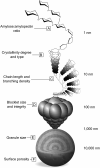Resistant starch, microbiome, and precision modulation - PubMed (original) (raw)
Review
Resistant starch, microbiome, and precision modulation
Peter A Dobranowski et al. Gut Microbes. 2021 Jan-Dec.
Abstract
Resistant starch, microbiome, and precision modulation. Mounting evidence has positioned the gut microbiome as a nexus of health. Modulating its phylogenetic composition and function has become an attractive therapeutic prospect. Resistant starches (granular amylase-resistant α-glycans) are available as physicochemically and morphologically distinguishable products. Attempts to leverage resistant starch as microbiome-modifying interventions in clinical studies have yielded remarkable inter-individual variation. Consequently, their utility as a potential therapy likely depends predominantly on the selected resistant starch and the subject's baseline microbiome. The purpose of this review is to detail i) the heterogeneity of resistant starches, ii) how resistant starch is sequentially degraded and fermented by specialized gut microbes, and iii) how resistant starch interventions yield variable effects on the gut microbiome.
Keywords: Resistant starch; clinical trials; microbiome; personalized medicine; personalized therapies; precision medicine.
Conflict of interest statement
A.S. has co-founded MedBiome, a clinical microbiomics company.
Figures
Figure 1.
The hierarchical structure of starch granules. The physicochemical properties (left-side) of glucose polymers influence the overall morphology and digestibility of the starch granule. The scale of each structural level is indicated on the right-side
Figure 2.
RS guild members show preferences for different RS in vivo. Primary degraders, secondary degraders, and cross-feeders discussed in-text that have been reported to significantly increase in relative abundance across 16 clinical trials where the microbiome was monitored. Lines indicate the frequency of reported associations. *Species-level differences among B. adolescentis and E. rectale/Roseburia could not be resolved in every study. Full data can be found in Supplemental Table 1.
References
- Gibson GR, Hutkins R, Sanders ME, Prescott SL, Reimer RA, Salminen SJ, Scott K, Stanton C, Swanson KS, Cani PD, et al. Expert consensus document: the International Scientific Association for Probiotics and Prebiotics (ISAPP) consensus statement on the definition and scope of prebiotics. Nat Rev Gastroenterol Hepatol. 2017;14(8):491–21. doi: 10.1038/nrgastro.2017.75. - DOI - PubMed
- Alfa MJ, Strang D, Tappia PS, Graham M, Van Domselaar G, Forbes JD, Laminman V, Olson N, DeGagne P, Bray D, et al. A randomized trial to determine the impact of a digestion resistant starch composition on the gut microbiome in older and mid-age adults. Clin Nutr. 2018;37(3):797–807. doi: 10.1016/j.clnu.2017.03.025. - DOI - PubMed
Publication types
MeSH terms
Substances
LinkOut - more resources
Full Text Sources
Molecular Biology Databases

